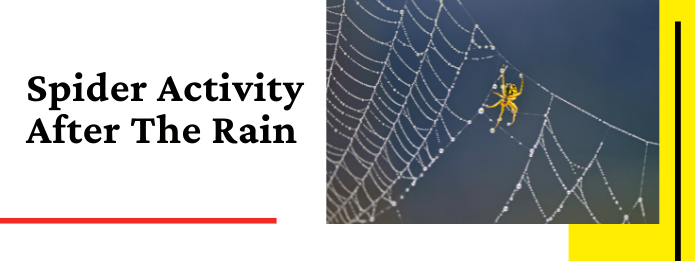Waterloo Pest Control: Spider Activity After The Rain

Indoor spider activity increases after a rainstorm. Both webbed and non-web spiders seek shelter and prey from the rain. Most spiders are following a target into the warm and dry environments of human homeowners. Find out what you can do to avoid an excess of insect visitors during the rain, how to prevent a spider infestation at all costs, and what to do if you need pest control in Waterloo.
Spiders
Generally unliked and shooed away at first sight, spiders are actually not the worst defence if you have other insects bombarding your home. The real problem might be the excess of other insects, aka spider dinner, that is attracting your eight-legged visitors. Spiders seek out insects to eat and will continue to board plenty of food and a dry environment. The inside of a house can often offer both if homeowners are not diligent in their preventative measures.
Webbed
Webbed spiders will come indoors because they seek prey and because their own home, a web, has been damaged by the storm. Some webs can withstand a light sprinkling, but more often than not, a spider can be injured or even trapped inside of a water-damaged web. Before the rain comes down, a webbed spider makes a break for it and follows prey elsewhere. Some examples of webbed spiders you’re likely to find inside are:
- Orb-weaver spiders
- Tunnel weavers
- House spider
Non-Web
Non-web spiders do not build webs to catch prey. Since they hunt for prey outdoors, their terrain can be flooded by the onset of rain. Thus, a non-web spider will take its hunt on the road and follow prey wherever they seek shelter. Additionally, hunting can be slim if all of their prey decides to creep indoors. Some examples of non-web spiders you’re likely to find inside are:
- Jumping spiders
- Sac spiders
- Wolf spiders
Folklore
Spiders can be found in worldwide mythologies. The Hopi tell of the Spider Woman while the Greek talk of Arachne. In Africa, Jamaica, and the Caribbean, the trickster Anansi is a spider. Some old folk tales say that if you find a spider on your clothes, then some money is headed your way. Other folk tales say that spiders predict the weather; when spiders spin giant webs, it’s a sign that a harsh winter is coming. Others say you can count on a spider to tell you when the rain is coming because they will leave their web before the first drop falls. Regardless, there can be too much of a good thing, and a spider infestation isn’t ideal for anyone.
Indoor Prevention
Working to prevent spiders from taking up residence indoors can be as easy as a routine cleaning task that you do once a week.
- Remove clutter, stacks of papers, boxes, toys
- Vacuum and wipe down corners, cracks, and crevices
- Sweep for crumbs and mop regularly
- Dust vents and intake ducts
- Make sure doors and windows are clean and seal tightly
Outdoor Prevention
Outdoor prevention to help seal off the exterior from bugs and spiders can be done quarterly or when you see that it needs additional attention. You can always call in professionals for inspection and assessment to determine how best to schedule exterior maintenance.
- Remove any webs in eaves
- Seal any cracks with caulk
- Trim back landscaping
- Remove any debris
- Keep trash at a distance
Removal
Remember that spiders often come indoors from the rain to follow prey. Hopefully, the prey was also just seeking shelter from the storm. However, maintaining a tidy home that is consistently inaccessible to other insects can help keep spiders out too. Calling a professional for an inspection and an estimate will clarify your needs before an infestation strikes.
If you suspect that you have a spider infestation and require professional inspection and spider removal services, contact Truly Nolen in Waterloo.